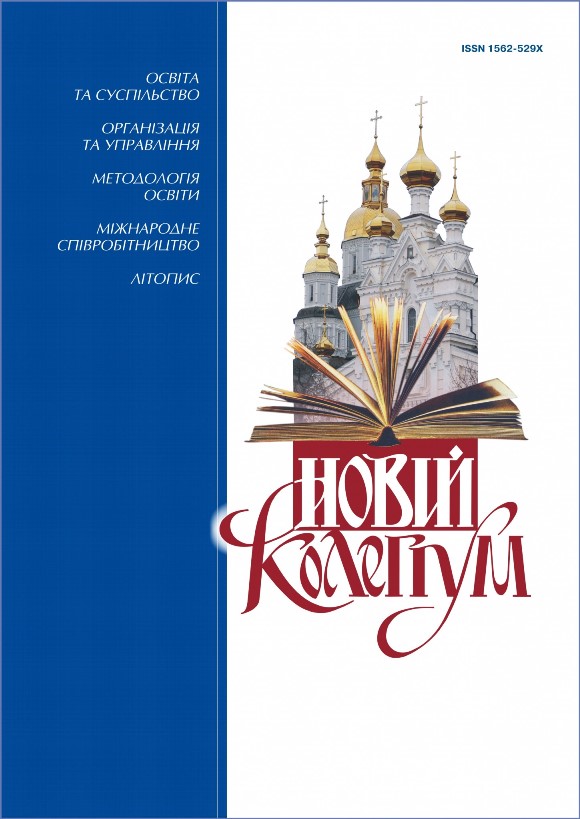The European toolkit for ensuring the quality of pedagogical education at the end of the 20th – beginning of the 21st century: challenges for Ukraine
DOI:
https://doi.org/10.30837/nc.2022.3.21Keywords:
education, pedagogical education, quality, quality assurance, general directions of quality assuranceAbstract
Over the past decades, the international recognition of the importance of professional training and development of teachers has led to a significant improvement and increase in the quality of the educational process in educational institutions. At the same time, the goal of professional growth of teachers in each country was determined in its own way, and the principles of functioning of its organizational models were characterized by considerable diversity. In Europe, there is still no unified system of institutional evaluation of the activities of educational institutions, similar to the accreditation system in the USA. However, each country has its own approaches to ensuring and assessing the quality of pedagogical education. The European toolkit for ensuring the quality of pedagogical education in the late 20th and early 21st centuries and its influence on the improvement of the domestic system of pedagogical education is analyzed.
It is determined that the study of the experience of professional training of teachers in foreign countries opens new opportunities for the improvement of the pedagogical education system in Ukraine in the conditions of its adaptation to the requirements of the European educational space. It has been proven that the general directions of ensuring the quality of pedagogical education in the countries of the European Community and Ukraine are: preparation of teachers for educational reform, consolidation of organizational structures in the field of professional development and rationalization of national systems of pedagogical education; improvement of the quality of professional training and improvement of teachers; focusing attention on all-European joint events in the field of professional development of teachers. It has been established that the key provisions of international and pan-European documents actually include a joint program of actions to improve the quality of pedagogical education, in which teachers are considered as the main agents of change in the implementation of the pan-European strategy for the development of education and training, the development of the European area of pedagogical education and its formation on this basis. global model of a modern teacher.
References
Берегова О. А. Міжнародний досвід професійного розвитку педагогічних працівників // Молодий вчений. 2017. № 10 (50). С. 397–401. [Електронний ресурс]. Режим доступу: http://molodyvcheny.in.ua/files/journal/2017/10/91.pdf
Вітвицька С. С. Моделі ступеневої педагогічної освіти західноєвропейських країн, США та України: порівняльний аналіз // Професійно-педагогічна освіта: сучасні концептуальні моделі та тенденції розвитку : монографія / Авт. кол. О. А. Дубасенюк, О. Є. Антонова, С. С. Вітвицька, Н. Г. Сидорчук, О. М. Спірін, Н. В. Якса та ін. ; за заг. ред. проф. О. А. Дубасенюк : вид. 2-е, доп. Житомир : Вид-во ЖДУ ім. І. Франка, 2008. С. 71–103.
Десятов Т. М. Стратегічні напрями реформування педагогічної освіти і моделей модернізації управління освітою в зарубіжних країнах // Вісник Черкаського університету. 2016. № 12. С. 48–56. [Електронний ресурс]. Режим доступу: http://ped-ejournal.cdu.edu.ua/article/view/1313/1342
Зязюн І. А. Інтелектуально-творчий розвиток особистості в умовах неперервної освіти // Неперервна професійна освіта: проблеми, пошуки, перспективи : монографія ; за ред. І. А. Зязюна. Київ : Віпол, 2000. 636 с.
Калюжна Т. Г. Сучасні вимоги до професійної підготовки майбутнього вчителя. [Електронний ресурс]. Режим доступу: http://lib.iitta.gov.ua/2555/1/Ніжин.pdf
Костецька М. В. Розвиток вищої освіти в Україні та країнах Європейського Союзу (кінець ХХ – початок ХХІ ст.): порівняльний аналіз : 13.00.01: автореф. дис. … д-ра. пед. наук ; Дрогобицький держ. пед. ун-т ім. Івана Франка. Київ, 2017. 22 с.
Національна доповідь про стан і перспективи розвитку освіти в Україні / Нац. акад. пед. наук України ; [редкол.: В. Г. Кремень (голова), В. І. Луговий (заст. голови), А. М. Гуржій (заст. голови), О. Я. Савченко (заст. голови)] ; за заг. ред. В. Г. Кременя. Київ, 2016. 224 с. (До 25-річчя незалежності України).
Носовець Н. М. Професійна підготовка майбутніх учителів у країнах Західної Європи // Вісник Чернігівського нац. пед. ун-ту імені Т. Г. Шевченка ; гол. ред. Носко М. О. Чернігів : ЧНПУ, 2015. Вип. 130. С. 68-72.
Поліщук Л. П. Шляхи формування загальноєвропейських принципів педагогічної освіти в умовах євроінтеграції. [Електронний ресурс]. Режим доступу: http://eprints.zu.edu.ua/9371/1/12plpsfz.pdf
Постригач Н. Розвиток процесів оцінювання у педагогічній освіті Італійської республіки в останню декаду ХХ століття. [Електронний ресурс]. Режим доступу: https://library.udpu.edu.ua/library_files/psuh_pedagog_probl_silsk_shkolu/43_1/visnuk_28.pdf
Професійна педагогічна освіта: становлення і розвиток педагогічного знання : монографія ; за ред. проф. О. А. Дубасенюк. Житомир : Вид-во ЖДУ ім. І. Франка, 2014. 443 с.
Common European principles for Teacher Competences and Qualifications Brussels: European Comission, 2004. 5 p. [Електронний ресурс]. Режим доступу: http://www.pef.uni-lj.si/bologna/dokumenti/eu-common-principles.pdf
Communication from the Commission to the European Parliament, The Council, The European Economic and Social Committee and the Committee of the Rerions. Improving competences for the 21st Century: An Agenda for European Cooperation on School, Brussels, 3.7.2008 COM (2008) 425 final, 13 р. [Електронний ресурс]. Режим доступу: https://eur-lex.europa.eu/LexUriServ/LexUriServ.do?uri=COM:2008:0425:FIN:EN:PDF
Hoskins B. and Fredriksson U. Learning to Learn: What is it and can it be measured? European Commission, Joint Research Centre Institute for the Protection and Security of the Citizen Centre for Research on Lifelong Learning (CRELL), 2008. [Електронний ресурс]. Режим доступу: https://www.researchgate.net/publication/242715655_Learning_to_Learn_What_is_it_and_can_it_be_measured/link/0c960530f385501c8a000000/download
New Insights from TALIS 2013. Teaching and learning in primary and upper secondary education, 2013, 332 p.
Siniscalco M. T. Statistical profile of the teacher profession. International Labour Office, Geneva United Nations Educational, Scientific and Cultural Organization, Paris, 2002. [Електронний ресурс]. Режим доступу: http://www.dominiopublico.gov.br/download/texto/ue000105.pdf
TALIS 2018 Survey. OECD, 2016. [Електронний ресурс]. Режим доступу: http://www.oecd.org/education/school/TALIS_2018_brochure_ENG.pdf
Teacher education and Development Study – Matematics, TEDS–M”, 2006. [Електронний ресурс]. Режим доступу: https://repository.nie.edu.sg/bitstream/10497/6170/1/NIE_research_brief_12-002.pdf

